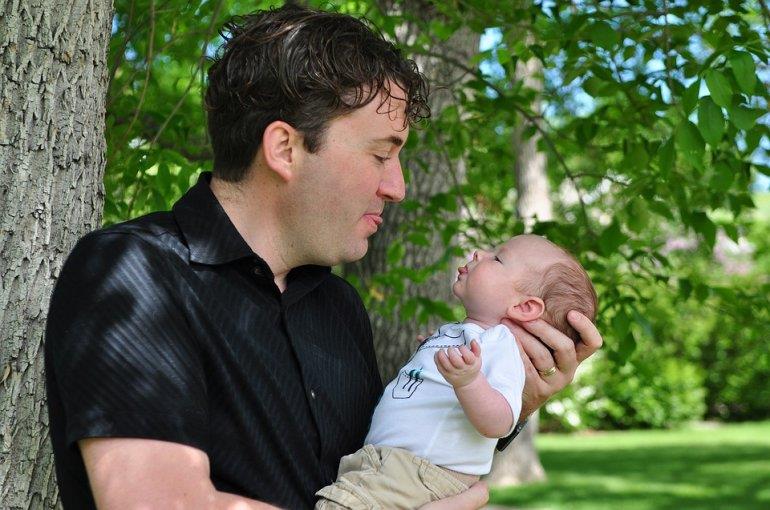
Recent research shows postpartum depression affect dads too
Like many fathers, Adam Elmaghraby enjoys spending time outdoors with his daughter. On weekends, he takes the 3-year-old to a farmers market, sharing his love of food with her and teaching her about fruits and vegetables.
Elmaghraby especially appreciates this time with his daughter, because his entry into fatherhood was difficult. A few months after her birth, he struggled with bouts of paralyzing anxiety and depression.
"Shortly after my daughter was born, I started feeling anxious. My mind would swirl, and I felt out of control. I didn't have enough time for myself, parenting and my professional life," he said.
Like many new parents, Elmaghraby struggled to adjust to the child-care responsibilities and sleep deprivation that a baby brings. As his mood worsened, he started to blame parenthood. But it took him nearly a year to reach out for help. Once he saw a doctor, he was diagnosed with anxiety and depression, the two most commonly diagnosed mental illnesses. However, Elmaghraby believes he was actually suffering from the same mental health concern that affects up to 15 percent of women each year: postpartum depression.
Although PPD mostly affects new mothers, recent studies have found that men might also suffer from the illness. And, according to one research study, hormonal changes could be partly to blame.
The study, published in the journal Hormones and Behavior, found a correlation between testosterone levels and symptoms of paternal postpartum depression. Using a saliva sample, the researchers measured each father's testosterone levels. They discovered that those with dipping levels of the hormone were more likely to feel depressed.
"Our findings suggest a potential biological and hormonal correlate of depression during the postpartum period," the study's author, Darby Saxbe, an assistant professor of psychology at the University of Southern California, said in an interview.
Symptoms of postpartum depression can include feelings of irritability and sadness, anxiety, insomnia and, in extreme cases, thoughts of self-harm. For women, postpartum depression is the No. 1 complication of childbirth, affecting 10 to 15 percent of new mothers each year. A 2010 meta-analysis of several studies also suggests that as many as 10 percent of dads also suffer from this psychological disorder.
But even though obstetricians and pediatricians monitor pregnant women and mothers for postpartum depression, new fathers are rarely screened, making it less likely that they're diagnosed and treated.
"Postpartum depression in men is not so easy to spot," says Will Courtenay, a psychotherapist in Oakland, California, who diagnoses and treats dads suffering from PPD.
According to Courtenay, depression can look different in dads. Instead of crying, they may become irritable, work constantly, or turn to gambling or drinking to cope with their emotions. Citing a meta-analysis in the Journal of the American Medical Association, he says that during the postpartum period, "especially during the three- to six-month period after the baby's birth, one in four dads suffers from postnatal depression."
Elmaghraby was never officially diagnosed with PPD, even after seeing a psychotherapist. "My therapist never addressed the possibility of postpartum depression with me. Luckily, a few friends mentioned that the illness could also affect men," he said. Just learning that fathers could suffer from PPD made Elmaghraby feel less alone and more willing to talk about his experience openly.
Although studies show that untreated maternal depression can affect mother-and-baby bonding, paternal depression can also influence a child's development.
"We know depression can impact the father-child relationship, as well as children's future behavior," said Sheehan Fisher, a clinical psychologist and researcher at Northwestern University.
According to Fisher, kids who grow up with depressed dads may have a harder time coping with negative emotions such as anger, anxiety and sadness. He said these children may be more likely to "act out" their feelings by misbehaving and becoming aggressive.
While biology and hormonal shifts may affect the mental health of new parents, social pressures can as well. Many of today's dads are stepping into new parenting territory, becoming more active parents than fathers of previous generations. And because of this, many feel unprepared.
"Because dads are more involved in parenting, it challenges their identities as men," said Bruce Linton, a psychotherapist in Berkeley, California, who provides individual and group counseling for fathers. He said today's dads may experience more depression and anxiety because they're uncertain how to parent effectively.
But unlike mothers who often rely on one another for support and guidance, fathers may be less open about their parenting struggles, making it challenging to find support.
"For me, the hardest part was being able to say that I needed help," Elmaghraby said.
Individual psychotherapy is usually recommended for postpartum depression, but peer support may also be helpful, which is why Linton began the Father's Forum, a support group for new dads.
"Meeting with other dads and talking about the stress that fatherhood brings is helpful," Linton says. Dads who attend his group share advice about how to approach the struggles of parenthood.
It took over a year for Elmaghraby to heal from his depression. During that time, he also separated from his daughter's mother and moved into a supportive co-living community, an increasingly popular living arrangement in the pricey San Francisco Bay area. Elmaghraby said living with professional colleagues and friends (as well as his daughter, part-time) helped him to feel more supported as a father.
"As fathers, we don't always receive the same cultural 'hooray' as mothers, and that's okay," he said. "Still, we should examine and honor what fatherhood means to us. Stepping into parenthood is humbling work, and it's important to ask for support along the way."

Legal Disclaimer:
MENAFN provides the
information “as is” without warranty of any kind. We do not accept
any responsibility or liability for the accuracy, content, images,
videos, licenses, completeness, legality, or reliability of the information
contained in this article. If you have any complaints or copyright
issues related to this article, kindly contact the provider above.

















Comments
No comment